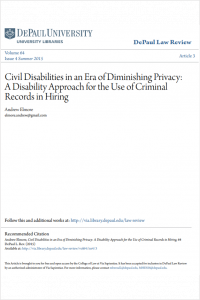Civil Disabilities in an Era of Diminished Privacy: A Disability Approach for the Use of Criminal Records in Hiring
Andrew Elmore, 64 DuPaul Law Review 991
(September 2015)
This Article proceeds in five parts:
- Part I briefly summarizes the key features of a disability normative and legal framework that apply to hiring screens, taking personality tests and genetic screens as examples. It also introduces the analogy of criminal records as a civil disability in need of disability privacy and equal opportunity protections.
- Part II describes the growth of criminal record history as a dominant negative credential in hiring, and the impact of overbroad criminal record hiring screens in reducing employment opportunities for people with criminal records, particularly those who are African-American.
- Part III discusses the ways in which federal, state, and local governments have responded to the increasing use of civil disabilities as negative markers in employment applications. It then evaluates these regimes, finding that Title VII disparate impact challenges often face insurmountable litigation hurdles, and that many state protections apply a vague “reasonableness” standard to apply criminal record screens. It also finds that procedural protections in some jurisdictions do not go far enough in ensuring an individualized assessment of candidates, that there are few privacy protections, and that those protections that do exist are often easily evaded.
- Part IV proposes a disability framework that would restrict employer access to long-ago and minor convictions that do not predict future behavior by sealing or expunging these records, while permitting employers to review the criminal records of conditional employees that may predict future behavior, and to reject those conditional employees who present a genuine risk that cannot be accommodated.
- Part V addresses potential criticisms of this approach—namely, that limiting criminal record inquiries will perversely increase discrimination against African-Americans and that privacy protections will not succeed in restricting employer access to civil disabilities.
Resource Type
Journal Articles
